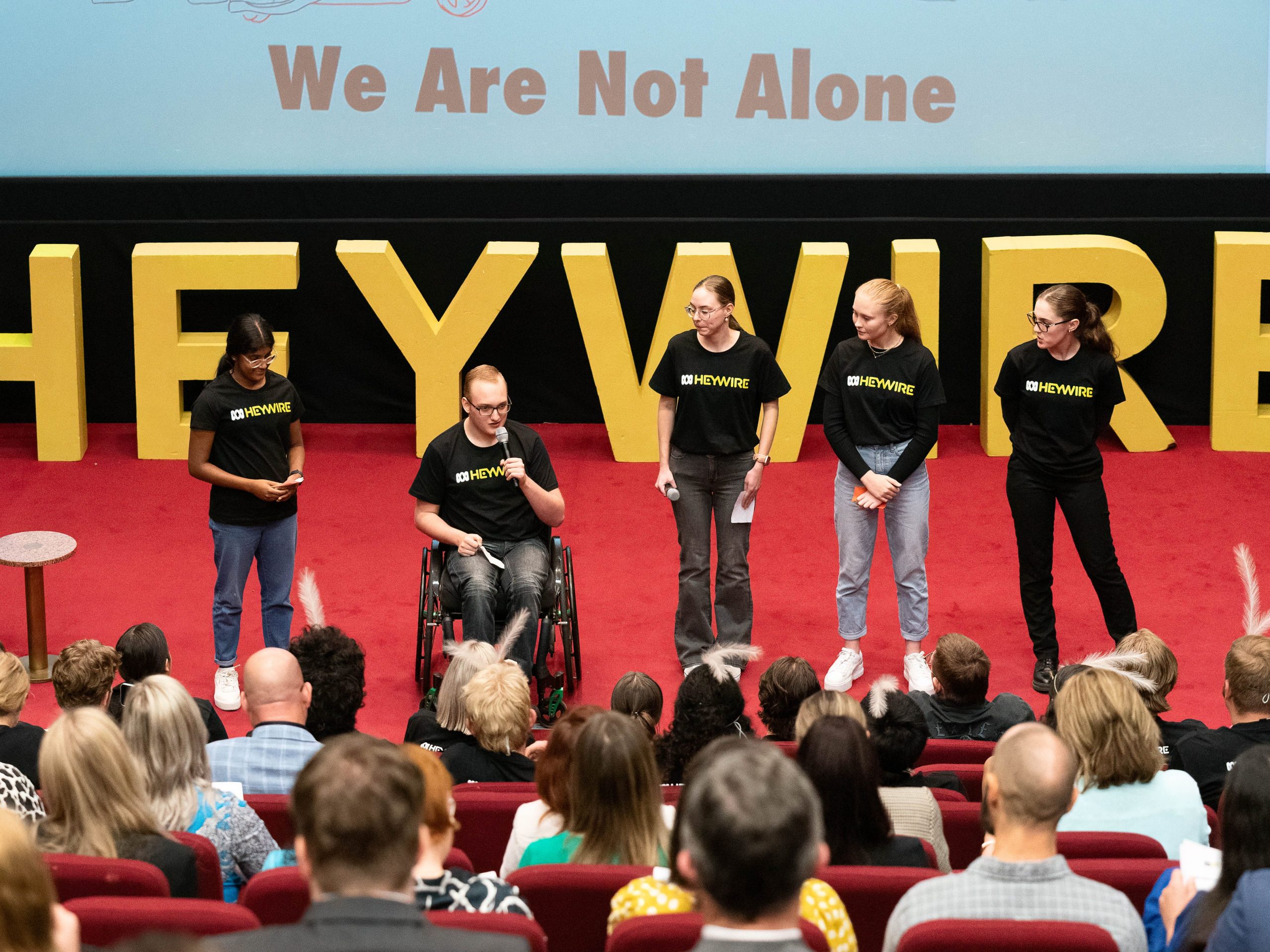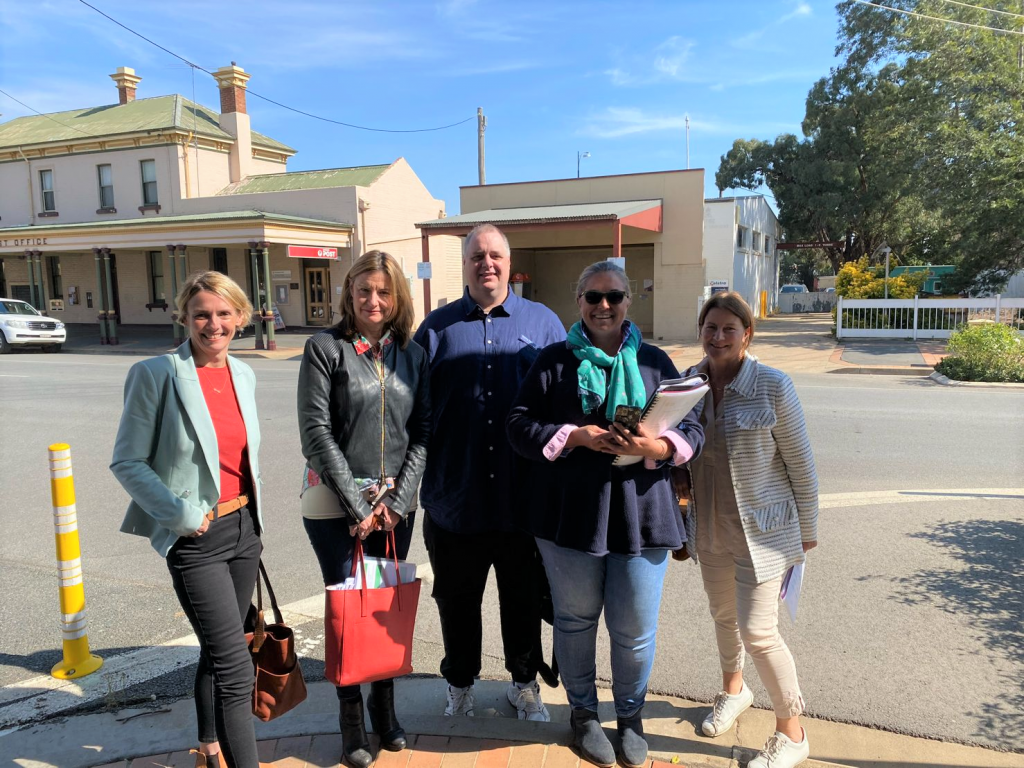Foundation for Rural & Regional Renewal (FRRR)
By Deb Samuels, People Portfolio Lead
With the rates of volunteering on the decline, how will we replace these tireless volunteers with a new generation of community leaders? It’s encouraging to know the Australian Government is making an investment in the future of volunteering. The recent press release from Minister Andrew Leigh’s office ‘Getting more young people back into volunteering’ provides some targets and strategies for engaging with and encouraging more youth volunteering and developing an open source ‘playbook’ for the sector.

Photo credit: Bradley Cummings
For rural, regional and remote communities, harnessing the energy and social consciousness of young people represents an incredible opportunity – and unique challenges – to do things differently when it comes to local community leadership and volunteerism. The work we do at FRRR supports so many volunteer-run groups providing critical services across these communities that may not otherwise exist. As the Government funded work unfolds to inspire future volunteers, developing a targeted strategy for engaging young people living in rural, regional and remote contexts will be so important to ensure the viability of these essential volunteer-run resources.
My work at FRRR provides an up-close view of the hopes, dreams and frustrations of young people living in rural, regional and remote Australia, through our partnership with the ABC Heywire, Takeover and Trailblazer programs. Young people who care deeply about fairness, diversity and equity, who are keenly aware that they will be emerging into adulthood in a world suffering the impacts of climate change, and who have grown up with technology and access to instant information at their fingertips. Young people who have lived their formative years impacted by a series of traumatic events – bushfires, drought, floods and a global pandemic – missing much anticipated milestones and often feeling unsure about what opportunities might still be open to them in the future. Young people who want to make sure the voices of diverse and marginalised people are heard, and who value flexibility and investing in wellbeing. Young people who, when given the opportunity and voice, are a source of innovative and practical solutions to some of the biggest challenges Australia’s rural, regional and remote communities are facing.
What I’m also seeing in our place-based capacity building programs, like Investing in Rural Community Futures (IRCF), is that the volunteers who have been the backbone of small community organisations for decades are now looking to retire and pass the baton. They are exhausted because so much of the recovery work, from the series of disasters in recent years, has fallen on their shoulders. They know the answer lies in engaging young people as the next generation of leaders but are often not quite sure how. We also see that young people want to connect and help, but they struggle to see themselves in the same roles their parents and grandparents have held, doing things the way they have always been done.
Instead of inviting regional young people to take a seat at the existing community leadership table, what if we first co-design a new ‘table’ with them? To hear and really listen to the ways they are inspired to connect. I couldn’t agree more that taking on a volunteer role can be empowering and career building for young people, but first we need to make sure we get the ecosystem right.
Could some volunteer opportunities be done remotely or more flexibly? Could a broader model of shared leadership be adopted? Could some traditional volunteer roles become paid or partially paid roles, so that young people without the means to donate their time, can still be involved in their community in meaningful ways and become inspired for a lifetime of connection to the sector? And definitely not to be left out – how can we make sure there’s a healthy dose of fun in volunteering?
There is sometimes an assumption made that because they are not showing up in familiar ways, young people don’t want to show up for community. What I see and hear is the exact opposite. Young people in regional communities are looking at complex problems, with fresh eyes, and coming up with entrepreneurial solutions. Like the volunteer Youth Leadership Committee at Heywire grantee Human Nature, who shaped their alumni program with the flexibility for young people to participate in activities that interest them and suit their personal life goals. And like the Regional Education Support Network (RESN), a youth volunteer-led organisation that has connected 1,400 school students with over 400 online peer tutoring volunteers across regional NSW and Victoria.
As young people imagine their futures, wouldn’t it be great if they had a career with a social impact focus on their radars as an exciting and viable one? To see staying in their rural, regional or remote community as a first choice to do work that aligns with their values, and not one that comes with a long list of compromises.
It brings me so much joy in my work at FRRR to know that we are committed to deeper engagement with regional young people. We are adding meaningful opportunities for their powerful voices to be present and truly heard in decision making that values their knowledge and reflects their values. This year, with generous donor support, we are embedding paid youth advisor roles to work alongside NFP’s implementing youth-designed projects funded through the Takeover Mildura program. We have also shifted a volunteer ABC Heywire Youth Internship role to a paid position, along with offering an honorarium for our Youth Advisory Panel who assess grant applications. This will ensure that all eligible young people have the opportunity to take a leadership role in deciding what projects best meet the needs of young people.
We never want to lose the opportunities for unpaid volunteering. However, when we are asking young people to share their expertise and lived experience, we need to make sure those unique skills are valued. Re-imagining how small volunteer-centred NFPs in remote, rural and regional communities might survive and continue to operate as vital community resources and services in the future is no small challenge. The answer lies with the young people who will both lead and need these programs and services. They are the solution, so let’s take every opportunity to listen and learn.
A rural NSW grantseeker is proving that philanthropic investment in people and skills can produce a huge return on investment – bringing in more than $2.4million in grants for his community.

While many Government and philanthropic funders won’t give grants for funding people or capacity building, Junee Business and Trades Community Liaison Officer Nicholas Pyers is showing such investments can pay large dividends.
Nicholas’s role has been funded since 2019 by The Foundation for Rural & Regional Renewal (FRRR)’s Investing in Rural Community Futures program. He has been successful in helping win and advise on grants totalling $2,483,226 – and is awaiting news on a further $1million of grants that are in progress for Junee, which is located 440km south-west of Sydney in the Riverina region.
FRRR CEO Natalie Egleton said that since late 2018, regional NSW communities have faced a series of unrelenting disruptions, with drought, bushfire, flood and the COVID-19 pandemic continuing into 2022.
“The impact on these NFP organisations has been significant. It has taken its toll on the people that lead and run these organisations and has increased their load and affected their wellbeing. The sector has been dealing with extreme fatigue, burnout, limited fundraising options, access to volunteers, disconnection and, in some instances wholesale organisational change.
“The funding of Nicholas and the grant support role is a great example of how investing in local jobs and paying someone who has skills can result in high-yielding results and impact for organisations and communities,” she said. “This gives weight to our practise of employing local people and leveraging their position to help build the capacity of the entire town or community,” Ms Egleton said.
The impressive tally has been reached by a combination of activities. The grants have been won either by Nicholas directly developing a project concept and budget, then writing and submitting the grant application, or him reviewing other grant applications that have been submitted, as well as him identifying grant opportunities for other groups so they are able to apply. Nicholas also provides support to individuals in organisations, building their capacity and knowledge of grant writing, which allows them to prepare and submit grants, and secure funding for their own organisations.
FRRR’s Investing in Rural Community Futures (IRCF) model was developed in partnership with Vincent Fairfax Family Foundation (VFFF) and aims to strengthen local not-for-profit (NFP) organisations and, ultimately, enable them to thrive. It is a grassroots approach designed to build and support the capacity of individual and collective NFPs, over a sustained period of time.
This program now operates in seven communities in NSW, delivering a blend of grants and capacity building activities supported by local facilitators. Junee, Leeton and the Nambucca Valley were the initial cohort of communities supported by the Vincent Fairfax Family Foundation. Supported by The Snow Foundation Nowra, Ulladulla & Batemans Bay started an IRCF program in 2020 and further investment by Bendigo and Adelaide Bank’s Community Enterprise Foundation saw Bay & Basin communities join in 2021.
Successful grants for the Junee community range from upgrades to sporting facilities and meeting rooms through to projects supporting the likes of a museum.

